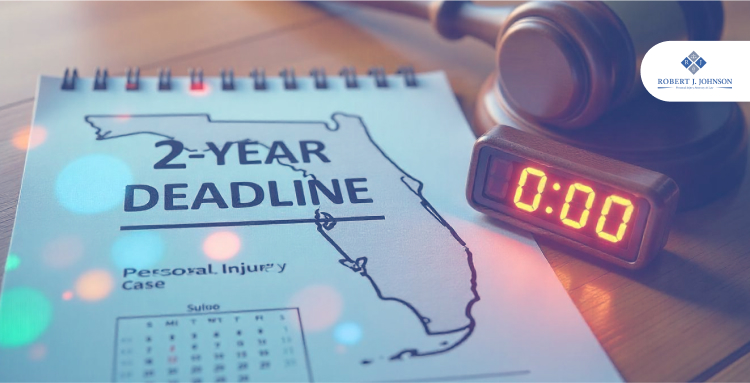
July 1, 2025
Why You Shouldn't Wait to Hire a Personal Injury Attorney After an Accident
There’s something strange about waiting after an accident. The clock ticks, but time doesn’t feel like a friend. It feels more like a stranger slipping past the door while you hesitate to open it.
You think you have days, weeks, maybe months before anything really matters. However, the truth is waiting changes everything.
Memories blur. Evidence fades. The people who saw it all? They move on. Life insists you move on too. And in that silence, the chance to make things right quietly slips away.
It’s not about rushing blindly. It’s about knowing that the longer you wait, the harder it becomes to claim what’s yours.
So when the dust settles, don’t let hesitation be the injury you never see coming.
1) Delaying Action Can Weaken Your Case Before It Even Starts
Right after an accident, time isn’t just moving—it’s working against you. Evidence that could support your case doesn’t wait around. Skid marks fade, vehicles are repaired, surveillance footage is erased, and witnesses forget the details that once seemed unforgettable. In Florida, these windows are especially narrow.
Florida saw over 394,000 traffic crashes in 2023.
(Source: Florida Department of Highway Safety and Motor Vehicles).
For example, in parts of Miami-Dade, traffic camera footage may be automatically deleted in as little as 72 hours if no one requests preservation. That kind of evidence can make or break a claim.
If it’s missing, insurers often argue there’s not enough proof to support your version of events. And once that opportunity is gone, no amount of explanation can take the place of visual records or timely witness statements.
2) The Insurance Company’s Role Is to Defend Against Claims

Once you report your accident, insurance companies will often make contact quickly. At first, this might seem like a helpful step—they may even sound friendly and eager to assist. However, their real goal is to resolve the claim quickly and as cheaply as possible. Many insurers call early to record a statement from you, which could be used later to undermine your case.
Injury victims represented by attorneys receive 3.5 times more in settlements on average than those without legal counsel
(Source: Insurance Research Council).
It’s common practice for insurance adjusters to present settlement offers shortly after an accident. These initial proposals are typically significantly lower than the full compensation you may be entitled to receive.
This happens because the insurance company aims to resolve the claim quickly—often before you’ve had the opportunity to fully understand the severity of your injuries, ongoing medical treatment needs, or lost income. Accepting a settlement too early can limit your ability to recover fair compensation later, especially if your injuries worsen or require extended care.
3) Florida’s Legal Deadline Moves Fast
In Florida, the clock is ticking the moment your accident happens. Under the statute of limitations, you have just two years from the date of the accident to file a personal injury lawsuit—this was reduced from four years as part of House Bill 837, which went into effect on March 24, 2023.
This may sound like plenty of time. However, in reality, that two-year window can disappear faster than expected when you consider the time needed for investigation, evidence collection, and legal preparation.
Some cases have even stricter deadlines. For example, if you're filing a wrongful death claim or if your case involves a government entity (e.g., a city or state agency), the deadlines may be even shorter. Government claims often require you to file a notice of claim within just three years and may have additional requirements. Missing these deadlines means your case could be dismissed entirely, no matter how strong it is.
Failing to meet the statute of limitations could result in your claim being barred (source: Florida Statutes § 95.11).
In Florida, where accidents happen every day, taking action early helps ensure you don’t miss the opportunity to pursue the compensation you deserve.
4) Medical Records Alone Don’t Tell the Full Story

Many people think that as long as they have medical records, their case will be clear-cut. Medical records alone don’t always tell the whole story. They may show that you went to the doctor or received treatment. They don't necessarily establish a direct link between your injuries and the accident. This is important when proving the extent of your damages.
Gaps in treatment can be a major issue. If there’s a delay in seeking medical care or if you skip follow-up appointments, insurers will use this to argue that your injuries weren’t serious enough to warrant full compensation. They might also claim that your injuries were pre-existing or caused by something other than the accident.
Nearly 25% of personal injury claims are denied due to weak or inconsistent medical documentation
(Source: Journal of Legal Medicine).
Legal professionals help organize your records in a way that strengthens your claim and avoids unnecessary challenges.
5) You Might Be Missing Out on Compensation You Didn't Know to Ask For
Many people focus only on the immediate costs of an accident, like hospital bills and car repairs. However, there’s much more that should be considered. When you suffer an injury, it’s not just about the physical pain—it’s also about the long-term effects on your life.
You might miss work, experience ongoing pain, or even face a reduced ability to earn income in the future. These things don’t always come with a price tag at the start. However, they absolutely should be factored into your compensation.
Average payouts for car accident claims increased by 60% when future rehabilitation and mental health care were documented and pursued
(Source: Florida Justice Association).
Many people overlook these elements. However, they can make a huge difference in the final settlement.
6) Florida’s Fault Rules Can Cut Your Claim Short Unless Handled Carefully

Under Florida’s modified comparative negligence law, updated in 2023, the amount you recover in a personal injury case depends on how much of the blame is assigned to you.
In crashes involving multiple vehicles, slip-and-falls with unclear hazards, or even pedestrian accidents, the fault line can blur quickly. And insurance companies know this. They may try to shift more blame onto you to lower or completely avoid paying out a claim.
That is why seeking legal counsel early on is critical. An attorney can gather statements, secure surveillance footage, and consult experts before those details fade or disappear. These early steps often shape the narrative around fault, and they make a difference when liability is up for debate.
Take a multi-car collision, for example. Without legal representation, you may be blamed for following too closely, even if another driver actually set off the chain reaction. In a store slip-and-fall, a lack of video evidence or witness statements can quickly turn into an argument that you weren’t paying attention. Insurers are quick to capitalize on silence or delays.
In disputed liability cases, injury victims without legal help are more likely to be assigned higher fault percentages, reducing or eliminating their compensation altogether
(Source: Insurance Research Council).
How Robert J. Johnson Can Take the Pressure Off After an Accident
After an accident, missing deadlines, signing the wrong paperwork, or giving a recorded statement too soon can all work against you. We take immediate steps to protect your claim under Florida law.
Our team collects evidence while it’s still available, speaks with witnesses, and handles direct communication with insurance companies. We also help ensure your medical records reflect the full impact of the injury, not just what shows up in the first report.
When Florida’s fault rules or statute of limitations apply, we respond with the right strategy for your situation. Every claim involves details that affect compensation: future medical care, pain, and lost time from work. We work to make sure nothing is overlooked. To discuss your injury claim, contact Robert J. Johnson for a free consultation. We're here to protect your case and support your next steps.






























































